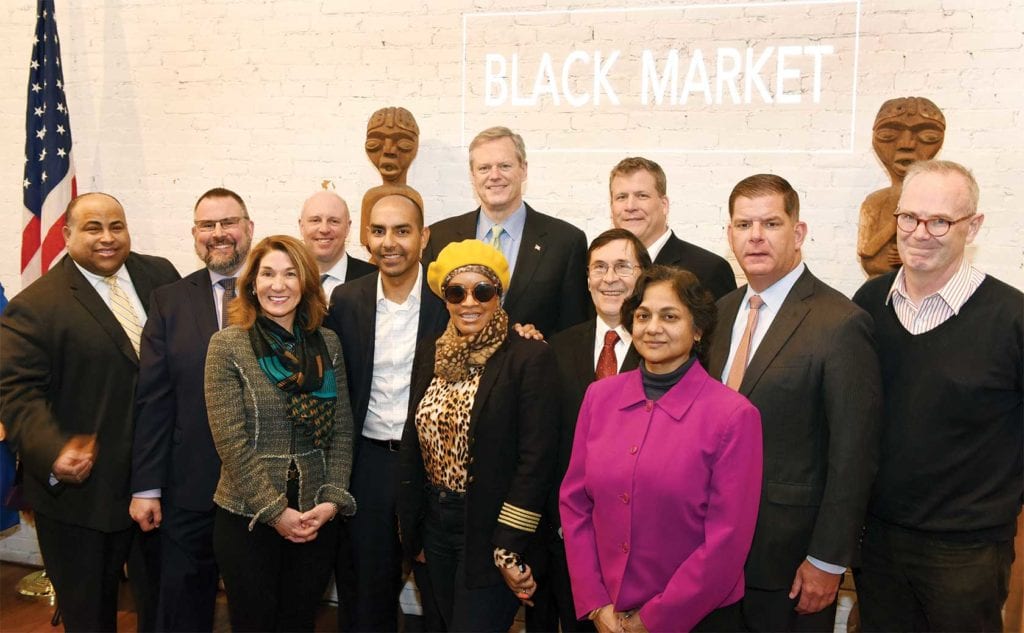Urban Agenda grants aimed at community revitalization
The Baker-Polito administration granted $2 million dollars to 23 community-based projects

On Feb. 19, the Baker-Polito administration granted $2 million dollars to 23 community-based projects across Massachusetts through the Urban Agenda grant program. Three local organizations in Nubian Square — The American City Coalition, Black Market and Haley House — will receive $100,000 to stimulate Roxbury’s growth and prosperity.
“We need to listen to the needs of the community and invest in things that will make the biggest impact,” Mayor Walsh said during the award ceremony held at Black Market in Nubian Square. “We need to make sure that we support our local community-driven programs, because we rely on the programs to make our neighborhood strong. That’s exactly what the Urban Agenda grants do.”
The Urban Agenda Program was launched in 2015 to fortify urban neighborhoods in Boston and other cities across the commonwealth. Neighborhoods compete for funding to spur economic advancement. The year-long grants aim to revitalize communities through increased business development, financial progress and entrepreneurial initiatives.
“These grants make a big difference for many great organizations,” said Gov. Charlie Baker. The grants were first awarded to projects that reflected suggestions from both the Black and Latino Advisory Commission. These commissions, established in 2017, prioritize equity and the advancement of minority communities.
The project grants were awarded to many local communities: Attleboro, Barnstable, Boston, Brockton, Chelsea, Everett, Fall River, Fitchburg, Greenfield, Haverhill, Holyoke, Lawrence, Lowell, Lynn, New Bedford, North Adams, Pittsfield, Revere, Salem, Springfield and Worcester.
“What I love about this program is that it’s a really unique program, because it’s designed to invite your creativity and your ideas help improve the conditions in a place in your community,” said Lieutenant Gov. Karyn Polito.
Grant accessibility will be streamlined soon, she noted, due to opportunities through the Community Compact Connector. She said that municipal leaders will get push notifications when grants are posted.
“So you don’t have to wonder, do they have a grant program here? Are there resources?” she said. “Just connect up with the municipal leads and they will tell you when these grants are available so you can collaborate with them and apply.”
Mike Kennealy, secretary of housing and economic development, introduced the “Partnerships for Growth” plan. The plan’s goal is to “enable the Commonwealth’s regions to build, connect and lead.” It primarily focuses on community development, mitigation of the housing crisis, support for businesses and workforce training.
“In our plan we have five key principles that are going to drive the work over the next few years,” said Kennealy. “One of them is equitable opportunity — the notion that every community, every region, every citizen deserves their shot at growth and opportunity and success.” He said that the title of the plan spoke to “our ability to work together to get important things done.”
Walsh told the Banner that equitable opportunity was the heart of a community.
“When you think about our neighborhoods, they’re not built around the Amazons of the world,” he said. “They’re built around neighbors and friends and businesses. You know, a lot of these businesses that we have in our city, in our communities, are our neighbors. So having a strong business community and having equity there is so important.”
Walsh also acknowledged the citywide Black Restaurant Challenge, which urges people to visit at least four black-owned restaurants during the month of February. People still have plenty of time to participate, he said, and later joked, “I think this a leap year, so you get an extra day!”
People should explore Nubian Square’s entirety, said Walsh, rather than just saving visits for special occasions.
“Come back to Nubian Square on any day of the week. Eat at one of our restaurants, shop at our stores, come to our stores, make sure you do that. Because that’s what makes a business district thrive,” he said.
He also told the Banner that there are 40,000 small businesses in Boston, and many are businesses of color. Walsh said he shops locally whenever he can.
“As you think about shopping, think in your head — is there a local option? And if there is, buy one or two things in the local option before you go in the malls.”
Kaidi Grant, owner of the Black Market, noted that resources should be given to entrepreneurs, founders and dreamers, “so that they can have the opportunity to change their own neighborhood.” She said that’s the narrative of the Black Market.
“You give us the tools and if we have the resources, and we create our own opportunities for resources, we can then use it as a springboard for self-sufficiency,” she said. “Because I think that what’s missing nowadays is that the power really comes from the ground up.”






